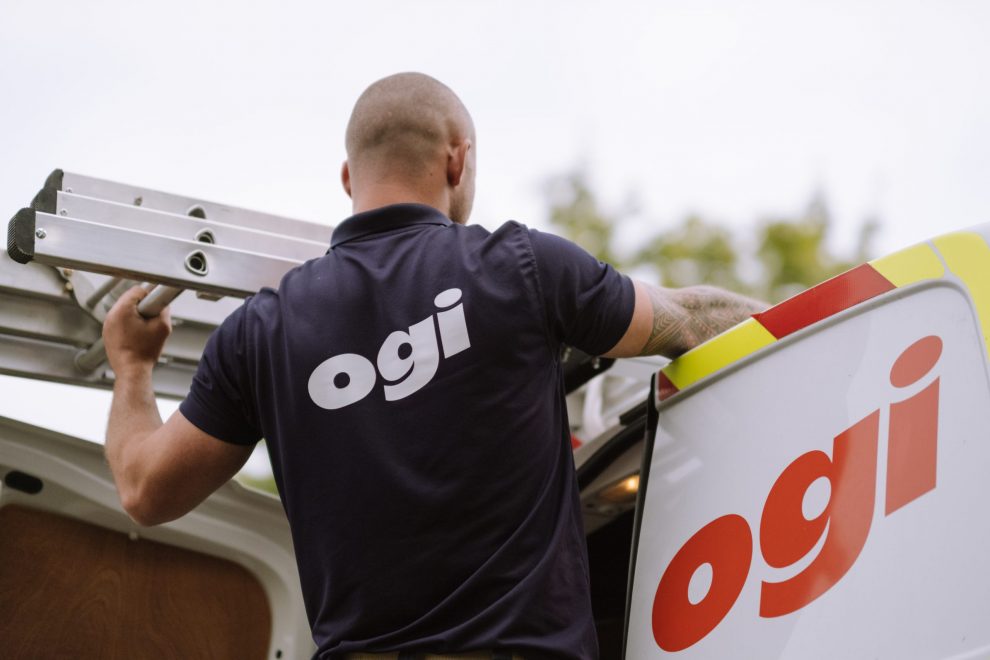HOME-GROWN broadband rollout is supporting 100s of Welsh jobs and connecting communities right across south Wales.
A year into its ambitious ultrafast roll-out plan and Ogi, Wales’s home-grown broadband company, continues to develop at pace.
The company has propelled onto the UK broadband scene, investing millions in communities across south Wales in the last 12 months. It’s directly creating up to 165 highly skilled jobs within the company at the moment, and supporting hundreds more through its supply chain, as it ramps up access to full fibre broadband in traditionally underserved towns and villages across the region.
One of the UK’s top ten new full fibre investors, Ogi is on track to delivering its first phase 150,000 premises plan, and intends to accelerate its roll out further, before the old copper networks are switched off.
Full-fibre broadband coverage in Wales increased from 19% to 27% of premises from 2020-2021, the highest year-on-year increase to that point – with Ofcom’s 2021 Connected Nations report citing Ogi as a contributor to this gear-change. Full fibre coverage in Wales is now 32%, roughly the same as the level across the rest of Britain.
To date, the company has already connected Haverfordwest, Rhoose, Llantwit Major, St Athan and Abergavenny, with services now available in Carmarthen two with more of south Wales in the company’s sights before the end of the year.
Full fibre networks are more efficient than traditional copper connections, and by enabling more people to work from home, Ogi’s services will bring wider carbon emissions savings too.
Named one of Wales’s ‘22 firms to watch in 2022’, Ogi continues to grow, opening four new offices this month to mark its first-year milestone, including premises in St Clears and Tongwynlais; a state-of-the-art network laboratory in Newport; and a flagship headquarters, ‘Tŷ Ogi’, in Cardiff’s historic Hodge House.
“Right from the start, our ambition has been to become a leading Welsh telecoms company, and the last 12 months have certainly laid the foundations for that goal.
“We’re continuously driven to bring next generation broadband to underserved areas across Wales.” said Ogi’s Chief Executive Officer, Ben Allwright.
“Ogi’s roll-out is bringing much needed connectivity to towns and villages across south Wales much faster than they’d otherwise be served, ensuring everybody has access to the same opportunities for a more prosperous and greener future.
“Our team live and work in our rollout communities and are passionate about the possibilities that Gigabit-connectivity is bringing.”
The brand’s local customer service offer is already securing a sector high 90% customer satisfaction rate, with the company partnering with leading Welsh and local organisations such as Haverfordwest AFC, Cardiff Rugby and Urdd Gobaith Cymru, further embedding itself in the communities that are benefiting from its full fibre roll-out.
In just 12 months, Ogi has enabled thousands of new full fibre connections across south Wales, bringing reliable connectivity and real market competition to homes and businesses in some of Wales’s most iconic towns and villages.
Moving to digital voice services: why it’s happening and what you need to know:
Most of Wales is still reliant on a copper infrastructure – technology that is decades old and was designed to carry voice signals rather than broadband.
In 2025 Openreach 1 plans to switch off their analogue phone service as a precursor to retiring their copper network and replacing it with full fibre which they are doing in phases between now and (it is estimated) 2030.
Many of us are using this analogue service to access our landline phones or broadband at home – it’s the technology most of us have grown up with, carrying our voice from one place to another.
These lines also support some of the lesser-known products in our homes and businesses, like burglar alarms, personal alarms and mains-powered fire alarms – making them, quite literally, a lifeline to many.
With the plan to switch off the network in the coming years, service providers are already looking at ways to safely move customers over to new technology like full fibre (sometimes called fibre to the premises).
But this comes with its own challenges, particularly in rural areas or places ‘missed’ by fibre rollouts of the latest mobile technology.
According to the most recent Connected Nations 2021 report, published by Ofcom 2, only around 61% of Wales has good mobile coverage from all four major operators, while around 15,000 homes and businesses are still unable to access a ‘decent’ broadband service of at least 10Mbit/s download speed.
Clearly then, there is a lot to do before we can completely abandon current technology, even if it’s clinging on longer than originally intended.
The good news is operators are already laying the foundations for new future-ready ultrafast fibre optic connections that can deliver faster speeds and are cleaner, more environmentally friendly for the planet. The new network will consume 80% less power and carbon. And the millions of miles of old copper cable can be recovered and upcycled.
Age Cymru and home-grown broadband provider Ogi have come together to help inform older people about the forthcoming phone systems digital switchover.
What’s happening?
The UK’s telephone network is being upgraded, so the technology we currently use to make landline calls, called ‘analogue’, is being replaced with an internet-based system, called an ‘IP network’.
Landlines will still exist, and you can still have a phone line in your home, but the system it uses will change. The upgrade is scheduled to take place between now and December 2025.
The changes are supported by the UK Government and Ofcom. They are needed because the current phone lines are struggling to cope with all the extra services we might use such as Netflix, iPlayer, and video games to name but a few. The old analogue system is also becoming difficult to repair and expensive to run.
Do I have to do anything?
You don’t need to do anything until your phone provider contacts you to discuss your needs. For many people the change will be as simple as plugging your phone into the supplier’s router to link into their system. In most cases, you’ll be able to keep your current phone number.

What might be affected?
If your phone handset is very old, you might need to change it. Things that currently use the landline network like telecare, personal alarms, burglar alarms and fax machines might also be affected by the change.
If your devices are relatively modern, they should still work fine but older ones may need to be reconfigured or replaced. Your phone provider will be able to advise you on all these matters.
Will I have to pay more?
BT, which provides the majority of landlines, have committed to not raising prices above inflation for customers who only use their landline for making phone calls for the next 5 years.
However, things may be different for those who use broadband services for their computer or laptop etc. You should always check with your current provider for the latest information on pricing.
Be scam aware
As the switchover is affecting millions of homes, this can create opportunities for criminals to try to scam people. These could be over the phone, via email, or at your doorstep.
The digital switchover will be free of charge, and no one should ask you for any payments – if they do, please report them to the Police using 101 and to Action Fraud on 0300 123 2040. If your bank account was used in a scam, contact your bank as soon as possible.
Other unscrupulous people may also try to sell you equipment or get you to sign up to expensive contracts that you don’t need. Don’t rush into any decisions, seek a second opinion, and speak to your phone company who will be to advise you about what you need.
What will happen if there is a power cut? What sort of back up support will be available?
When there’s a power cut you may lose access to some or all of your services. Therefore, your current service provider will work with you to make sure you have a suitable backup in place such as a mobile phone, a battery back-up or some other solution.
For more information
Your current phone provider should be in touch with you to let you know when your services are due to change and what, if anything, you need to do. You can always contact them too – at any time – using the customer service details on any documents from them such as your bill. You can also visit Age Cymru’s website or call the charity’s advice service on 0300 303 44 98.
A few reasons to care about full fibre broadband
Top tunes, show tunes, folk ballads and sacred anthems. The belters and the bangers. When you tap out a rhythm with your fingers or your feet, you conjure the whole experience. Not just the music, but the memories, the moments and the mood.
I can tell you exactly where I was – and how I was – when I first heard The Manics’ ‘Design for Life’. Such rich information, from a few simple finger taps.
Pretty wonderfully, music has never been more accessible than it is now, thanks to digital technology and the internet. More accessible to make, to share, and of course, to bathe yourself in the experience.
If you stream your tunes over Ogi they flow from us to you as rich information too, and our equivalent of each finger tap is the briefest flicker of light. Just light, pure and simple, from the heart of their network all the way into your home. Light with nothing added and almost nothing taken away.
Those streams of light flow inside an optical fibre: a strand of glass that allows those tiny pulses to move swiftly and cleanly over some very impressive distances. You can even bend the strand and it still does its thing. You could say it’s kinda magic.
Is this relevant to you and your experience?
Yes, in lots and lots of ways. Great broadband experiences in the UK – for music or anything else – are a bit of a postcode lottery. So we’re fixing that. Full fibre broadband isn’t affected by stuff that plagues every other kind of broadband – like the distance of your home from your nearest big green cabinet, or old copper cabling, or the weather that day.
That means its performance is very predictable – metronomic, in fact. And because it’s a new kind of infrastructure with fewer active parts, it’s a lot more reliable too. That means that you get the service that the marketing promised you, with no exceptions.
Also, the service they provide you is future proofed. When the time comes – and it will – to increase your Ogi speed x10, or even x100, they can do it affordably, without any unplanned disruption or delay for you.
Ultimately that comes down to ‘a trick of the light’. Light comes in many colours so let’s imagine right now we’re pulsing red light through Ogi’s fibres. They can add capacity by using additional colours.
Their fibre can carry a whole rainbow, and then some. That’s why they say that their network will be a positive legacy in Wales for the next five generations, at least.
Then again, full fibre broadband is more sustainable. They can build it just once and then continually up-cycle it – as I’ve just described above. And on a day to day basis, operating a full fibre network can save a lot of power and CO2.
Those light pulses travel a long way, between us to you, without us needing to either amplify them or convert them into any other kind of signal. So full fibre is the choice to make if you care about people and our future on this planet.
Maybe the best reason for the here and now is that full fibre broadband brings you the ultimate, unlimited, prime-time digital experiences: for living, learning, working and wellbeing. If you want to be your best digital you, choose full fibre.
Typically, networks have not been built this way.
Services advertising superfast ‘fibre broadband’ have been around for a while, and might lead you to believe that this fibre thing is nothing new. But they’re not telling the whole truth. Their fibre only runs part of the way to your home. And where it ends, telephone lines or other sorts of old copper cables take over. Your broadband experience is only as good as the broadest, most reliable link in the chain from network to home. So how can partial fibre solutions fix anything?
It takes time, expertise and a lot of investment to build full fibre broadband networks – which is why they are pretty rare here. In an international league table of full fibre connections, the UK currently sits at no. 22. We can do better.
So when they emphasise their full fibre broadband services, it’s not some marketing gimmick, or us trying to out-shout the competition. For us, it’s a standard that all broadband networks need to ultimately achieve. And for you, it’s a guarantee of the fastest, greenest and downright bestest musical, magical, digital experience that your money can buy.


















Add Comment